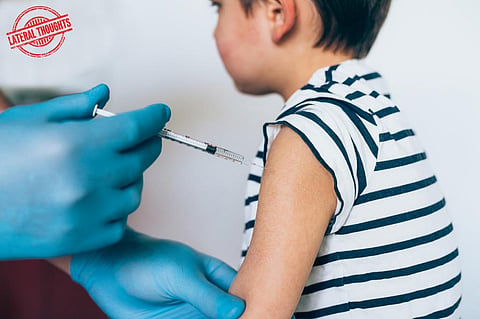Lateral thoughts: The price of vaccine
Vaccines against the novel coronavirus disease (COVID-19) became available for India's senior citizens and those with comorbities aged 45 and above from March 1, 2021. The day started with Prime Minister Narendra Modi receiving the vaccine at Delhi’s All India Institute of Medical Sciences.
For him, and others who opt to get vaccinated at the public hospitals, the vaccine is free. Those who go to private hospitals for the vaccine will have to pay Rs 250 per dose in accordance to the cap that the government has put.
Out of this, the cost of the vaccine is around Rs 150 while the rest is for the services provided by the hospital and infrastructure they have set up for the purpose.
At the press briefing February 21, 2021 on the actions taken, preparedness and updates on the novel coronavirus disease (COVID-19), Union health secretary Rajesh Bhushan talked about the role of private service providers in the vaccination drive. But the data he shared revealed that out of the 10,000 places where the vaccine is available, only 2,000 are in the private sector.
While the private hospitals do have a role in the existing healthcare system, they do not seem to be the answer to India’s healthcare needs. This is especially true for rural areas.
Private hospitals play a peripheral role in India’s universal immunisation programmes for children, said the Key Indicators of Social Consumption in India: Health report published in November 2019. This is of concern because India has nearly twice as many private hospitals as public ones, most of them in urban areas.
In the rural areas, almost 94.9 per cent vaccines to children aged 0-5 years was through the public sector, 2.6 per cent by organisations run by charitables, trusts or non-profits, and 2.1 per cent through the private sector. In urban areas, the figure was 85.9 per cent for the public sector and 11 per cent for private.
According to World Health Organization, since March 2020, routine immunisation services have been disrupted on a scale not seen since the inception of the Expanded Programme on Immunisation in the 1970s.
An estimated 19.4 million children did not receive essential vaccines during the COVID-19 pandemic. Ensuring that children are vaccinated against diseases has been also considered important for meeting sustainable development goals set by United Nations.
We are yet to see data on impact on vaccination in India but the private sector failed to provide services during the pandemic. Most just shut down and even when they did provide the services, their costs were high.
The state governments failed to tame the private industry. For example, when West Bengal announced that treatment would be completely free at both the public and private hospitals, they were unable to get large corporate private hospitals on board.
In New Delhi, private hospitals were asked to apply subsidised rates on 60 per cent total hospital beds but patients were directed to unsubsidised beds as a norm.
People have been waiting for the COVID-19 vaccine for nearly one year. The vaccine has to be delivered to the rural areas too. But the government has failed so far to improve healthcare facilities there.
There is often an acute shortage of healthcare professionals in rural areas where more than 60 per cent of India’s population lives. Only 40 per cent of the country's healthcare providers work here.
In the past, the government has often tried to fill this gap by bringing out schemes to train rural doctors. Recently, when the central government decided to set up health and wellness centres in rural areas, they had to hire Ayush doctors to helm them as MBBS doctors were not available. Unfortunately, these schemes are opposed by the private service providers.
This should wake up the government once again about taking serious steps to improve public healthcare in rural areas. This would not only benefit routine immunisation but also improve overall health status in rural areas.
Maybe, something good will come out of the pandemic after all.


